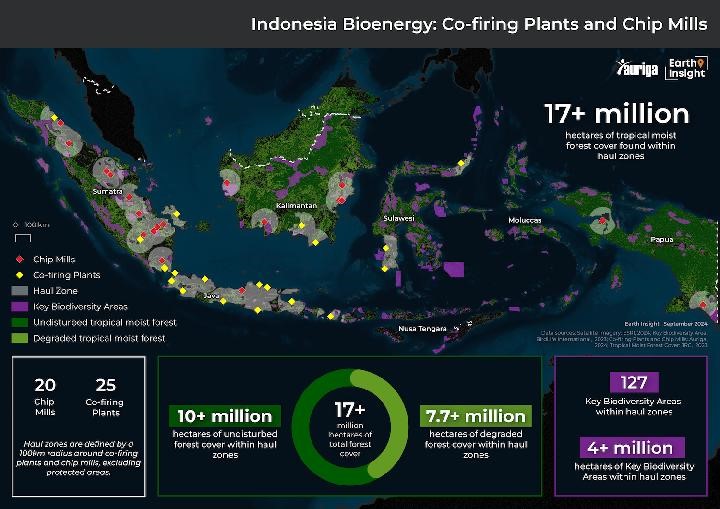New research unveiled at the ASEAN Summit has revealed alarming threats to Southeast Asia’s tropical forests due to the rapid growth of the wood-to-energy industry. The report, ‘Unheeded Warnings: Forest Biomass Threats to Tropical Forests in Indonesia and Southeast Asia’, exposes how Indonesian, Japanese, and South Korean energy policies push a “false climate solution” that could result in significant deforestation and environmental degradation.
According to the findings, more than 10 million hectares of intact tropical forests in Indonesia — an area equivalent to over eight million FIFA football pitches — are at risk due to the increasing demand for wood chips and pellets to fuel energy plants in Japan, South Korea, and Indonesia. The report, co-published by organizations such as Earth Insight, Auriga Nusantara, and Forest Watch Indonesia, highlights the destructive impact of biomass energy policies that support burning wood for fuel, contributing to massive deforestation and biodiversity loss.
Key findings of the report highlight detailed insights into the scale of the threat, including more than 10 million hectares of intact tropical forests are endangered by energy plantations and wood pellet plants, spanning over 127 Key Biodiversity Areas (KBAs); 400,000 hectares of undisturbed forests, including areas home to orangutans, fall within energy plantation zones, threatening rich ecosystems; haul zones of wood chip mills and co-firing plants could further endanger over 4.1 million hectares of orangutan habitat.
The report’s field investigations in Gorontalo revealed large-scale deforestation, with over 1,000 hectares of primary forest cleared in the past year alone for wood pellet exports to South Korea and Japan. Local communities are beginning to voice opposition to these activities, concerned about the devastating environmental and social impacts.

Energy Policies Threaten Forests
Indonesia’s energy transition plans, which aim to generate 19.7 TWh of energy from woody biomass by 2025, are a central driver of deforestation. Over 60% of this energy will come from co-firing wood with coal, with forest concessions designated as ‘energy plantations’ expected to supply half of the necessary biomass. This could destroy forests at an industrial scale, with deforestation rates potentially reaching 2.1 million hectares per year.
Countries like Japan and South Korea are major contributors to this demand. In 2021, these nations purchased over 99% of Indonesia’s wood pellet exports. Their subsidy programs have dramatically increased the production of wood pellets in Southeast Asia, encouraging further forest destruction. South Korea’s renewable energy policies alone have expanded the production of wood pellets from 20,000 tonnes in 2012 to 330,000 tonnes by 2021, while Japan is projected to become the world’s largest consumer of wood pellets.
Experts warn that burning wood for energy is not the sustainable solution it claims to be. While biomass is often categorized as carbon-neutral, this classification ignores the carbon emissions from deforestation and wood combustion. Biomass power plants emit up to 60% more CO2 per megawatt-hour than modern coal plants. Moreover, the carbon debt — the time it takes for regrowth to offset these emissions — ranges from 40 to 900 years, depending on the forest type.
Amidst this growing crisis, local leaders and environmental advocates call for immediate action to protect the region’s forests and communities. Timer Manurung, Executive Director of Auriga Nusantara, warned that the expansion of biomass plantations in Indonesia could destroy critical ecosystems and worsen the country’s climate challenges. “Japan and South Korea are driving the market for biomass plantation expansion. At the same time, the government’s co-firing policy could increase woody biomass consumption by 8,400%, posing an enormous threat to our remaining forests and local communities,” Timer stated.
Environmental groups are urging Southeast Asian governments to reconsider their reliance on biomass and invest in sustainable energy solutions. Tyson Miller, Executive Director of Earth Insight, stressed that the region’s decision-makers should heed scientists’ warnings and prioritize renewable energy sources like wind, solar, and tidal power.”Going down the path of biomass will not only increase greenhouse gas emissions but also undercut nature-based solutions that are crucial for addressing the climate crisis,” he said.
The urgency to protect Indonesia’s forests, a vital carbon sink and home to endangered species, has never been greater. As the global demand for renewable energy grows, the challenge lies in distinguishing genuine solutions from those that risk causing further harm to the environment and the people who depend on it.
the source the article comes from Tempo.co



